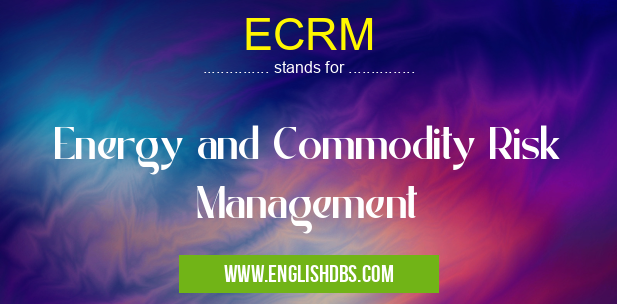What does ECRM mean in MANAGEMENT
ECRM (Energy and Commodity Risk Management) is a specialized field within risk management that focuses on mitigating the financial risks associated with energy and commodity markets. These markets are characterized by their volatility, complexity, and global interconnectedness, posing significant challenges for businesses operating in these sectors.

ECRM meaning in Management in Business
ECRM mostly used in an acronym Management in Category Business that means Energy and Commodity Risk Management
Shorthand: ECRM,
Full Form: Energy and Commodity Risk Management
For more information of "Energy and Commodity Risk Management", see the section below.
» Business » Management
Definition
ECRM is the process of identifying, assessing, and managing the risks associated with energy and commodity price fluctuations. It involves developing strategies and implementing measures to protect businesses from the adverse financial impacts of these fluctuations.
Key Objectives
The primary objectives of ECRM include:
- Financial risk mitigation: Minimizing the impact of adverse price movements on business profitability and cash flow.
- Price volatility management: Stabilizing revenue and costs by hedging against price fluctuations.
- Regulatory compliance: Adhering to industry regulations and reporting requirements related to energy and commodity trading.
- Decision support: Providing data and analysis to support informed decision-making in energy and commodity procurement and trading.
Key Components
ECRM typically encompasses the following key components:
- Risk identification: Assessing the potential risks associated with energy and commodity markets, such as price volatility, supply disruptions, and regulatory changes.
- Risk assessment: Quantifying the likelihood and potential impact of these risks.
- Risk management strategies: Developing hedging strategies, such as futures contracts, options, and swaps, to mitigate price risks.
- Risk monitoring: Continuously monitoring market conditions and adjusting risk management strategies as needed.
Essential Questions and Answers on Energy and Commodity Risk Management in "BUSINESS»MANAGEMENT"
What is Energy and Commodity Risk Management (ECRM)?
ECRM is a specialized field that involves identifying, analyzing, and mitigating financial risks associated with energy and commodities trading. It encompasses a range of activities, including price forecasting, hedging strategies, and risk assessment.
What are the key objectives of ECRM?
The primary objectives of ECRM are:
- Minimizing financial losses due to price fluctuations
- Ensuring stable cash flows and profit margins
- Optimizing trading strategies and reducing risk exposure
- Complying with regulatory and accounting standards
Who typically uses ECRM services?
ECRM services are primarily utilized by companies involved in the energy and commodity sectors, such as:
- Energy producers and distributors
- Commodity traders and brokers
- Financial institutions and investors
- Industrial consumers of energy and commodities
What are the benefits of implementing ECRM practices?
Implementing ECRM practices can provide numerous benefits, including:
- Reduced financial risks and improved profitability
- Enhanced operational efficiency and decision-making
- Improved compliance with industry regulations
- Access to specialized expertise and market insights
What are some common challenges in ECRM?
Some common challenges in ECRM include:
- Volatility and uncertainty in energy and commodity markets
- Complex and evolving regulatory landscape
- Managing multiple risk factors and interdependencies
- Access to accurate and timely data
What are the key skills required for a successful ECRM professional?
Successful ECRM professionals typically possess the following skills:
- Strong understanding of energy and commodity markets
- Expertise in financial risk management techniques
- Proficiency in data analysis and modeling
- Excellent communication and presentation skills
- Ability to work in a fast-paced and dynamic environment
Final Words: ECRM plays a crucial role in protecting businesses from the financial risks inherent in energy and commodity markets. By implementing robust ECRM strategies, companies can enhance their financial stability, reduce volatility, and make more informed decisions related to energy and commodity procurement and trading.
